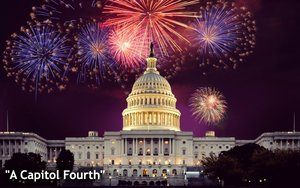
People will soak up all sorts of garbage on TV without complaint, but when PBS inserts some fireworks footage from a year ago into its annual Fourth of July
telecast, the Twitter scolds scream bloody murder.
Sorry, Twitter ninnies, but I have to side with the TV people on this one. Complaining about producers using some
footage of the 2015 Washington fireworks display in Monday night’s “Capitol Fourth” show seems like an extreme case of misspent energy and misplaced outrage.
The stories began to circulate Monday night after the telecast was over: Due to cloudy, rainy conditions in the nation’s capitol, the annual fireworks extravaganza in
D.C. lacked the brightness and flamboyance of previous fireworks displays staged in clear weather conditions. The result was that portions of the display didn’t play well on television. So
during the show, producers subbed some footage from last year’s fireworks because the weather was clear then and the fireworks were more telegenic.
advertisement
advertisement
This generated various complaints on Twitter. It’s hard to say how many, but there were enough apparently to draw the attention of the Washington Post, which posted this story Monday
night.
“Not cool @PBS,” tweeted one armchair critic. “Fake footage of fireworks on the Fourth???? It’s cloudy and rainy in DC. Those
shots are clearly not from tonight.” Heaven forbid!
“Thanks for your fake coverage of the July 4th, Washington DC fireworks PBS!” scolded another, who added the hashtag “#beAshamed.” Oh, the shame of it!
News flash: Artifice
is common in television. See the publicity photo accompanying this blog? PBS made it available as part of its promotion materials for “A Capitol Fourth.” To me, the photo looks enhanced.
Get over it.
On one level, I can understand why a person might feel bamboozled when watching a TV show that is supposed to be an unadulterated live telecast
of an event, and then easily detecting that it isn’t. The complainers on Twitter who weighed in on the subject of PBS’s fireworks footage were likely located in the D.C. area and were well
aware the weather wasn’t clear.
But then they had this urge -- so common today -- to go on social media and tattle on PBS. This seems to be
everybody’s ambition these days: Stumble across something they don’t like, or something they think is wrong, and their first instinct is to blab it all over the place in order to
demonstrate how smart they are.
It’s true that the PBS producers acted unwisely -- not in using the year-old footage, but using the footage and not
telling their audience about it. All they had to do was put some discreet words on screen saying “previously recorded” or “recorded in 2015” and the complaints would have been
instantly deflated.
But here’s the thing: You often don’t know these days what’s real or fake on TV, even when it comes to live TV such as
newscasts, for example. One of the trends sweeping the TV news business is the adoption of “virtual” sets that look like the real thing but are really just images of an environment onto
which the news anchors are super-imposed.
If it hasn’t happened already (and it probably has), it won’t be long until correspondents
supposedly “in the field” will be faking it in similar virtual surroundings -- telling you they’re at the corner of Fourth and Main, but in reality, they’re still in the
studio.
In the case of PBS’s “Capitol” offense on July Fourth, I suspect that the complainers -- and the subsequent coverage in the news
media -- will have the desired effect on PBS. How much do you want to bet they will never sub stock footage of a fireworks display into a live telecast ever again?